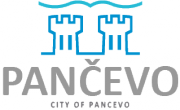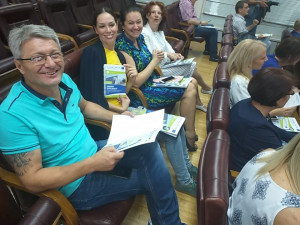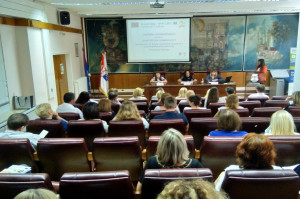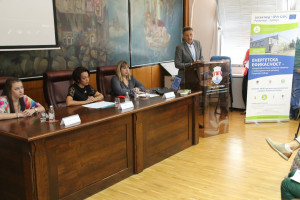Mayor, Sasa Pavlov, City Manager, Maja Vitman, project’s Financial manager, Miriam Vilceanu and project coordinator for the city of Pancevo and Assistant Project Manager, Andjela Vila addressed all present.
Sasa Pavlov, Mayor of Pancevo congratulated the team members on the successful implementation of the project and especially emphasized the fact that there were several promotional and educational activities on energy efficiency and renewable energy sources.
He noted that in addition to these visible benefits gained from the project, there were others. He spoke about the work of educating the youngest and all of us, because of the need for education on how to achieve energy efficiency. He mentioned the gatherings of young athletes, handball players, triathletes, swimmers, who were in ReSita and Pancevo, and thus continued a process started with the twinning of two cities and in this way guaranteed continuation of cooperation in the future.
He singled out sports activities for the youngest ones, that is, the activity of the Green Sport project, because of the importance of educating the young ones about environmental protection. He reminded everyone present that we have been twinned with the town of Resita for 47 years, since 1972, almost at the same time when the Sports Hall was built.
The Sports Hall has been energy-rehabilitated and reconstructed after 50 years, the construction has improved the conditions for quality training of athlete’s and development of sports skills, but also for visitors who will be able to watch the upcoming sporting events and matches in a much more comfortable atmosphere, reminding once more that this project is with a long time twinned city.
City Manager, Maja Vitman thanked the managers, the whole team and all project associates on both sides who approached the project responsibly and ambitiously with all the time constraints and specificity. She emphasized the importance of the Cross-border Cooperation Program with Romania for the City of Pancevo, which has been working on the projects of this Program for more than 10 years. She also stressed the importance of this Program for the region, considering the amount of funds for the 2014-2020 period of € 74,906,248 by the European Union, as the largest of all cross-border programs available to Serbia.
On this project, the first infrastructure project of the City of Pancevo, the city had minimal investments, which is the essence of such projects, but also highly
defined program procedures that have been successfully implemented, on the basis of which significant and useful experiences have been gained.
This project was implemented within the program priority – Environmental protection and risk management, with the aim of Environmental protection and sustainable use of natural resources.
In the past 27 months of the project implementation, the Sports hall has been reconstructed to a energy-efficient building. Insulation of the walls with stone wool and ventilating facade, insulation of the roof of the building, joinery was replaced, a new air-conditioning chamber was installed, which allows the supply of outside fresh air, removal of polluted air, additional heating and cooling of the room and two heat pumps.
The sports hall has so far been extremely energy-inefficient, with large budgetary funds being spent only on heating. The facility did not have the possibility of cooling in the summer, so this project also included cooling and heating.
Miriam Vilceanu, Financial manager from Resita, said that in Resita they worked extensively to promote environmental protection and the use of renewable energy sources. She explained that they installed solar panels on the roof of the city pool and purchased 60 bicycles for a bicycles share system in the city.
Andjela Vila, Assistant Project Manager presented all stages of the project and what was done within each. She thanked the Mayor for support in the preparation phase of the project and later for her giving her the opportunity to coordinate the implementation. She stressed out the long way from preparation to a successfully implemented infrastructure project lasted four years











